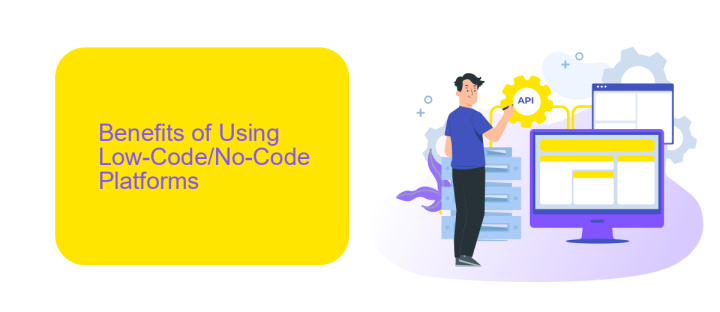Why Low-Code No-Code
In today's fast-paced digital landscape, the demand for rapid application development has never been higher. Enter low-code/no-code platforms—revolutionary tools that empower individuals with minimal technical skills to create robust applications swiftly and efficiently. This article explores the key benefits of low-code/no-code solutions and why they are becoming indispensable for businesses seeking agility and innovation.
Introduction
In today's fast-paced digital landscape, businesses are constantly seeking ways to accelerate their development processes and reduce time-to-market. Low-Code No-Code (LCNC) platforms have emerged as a revolutionary solution, enabling organizations to build applications with minimal hand-coding. These platforms empower not only professional developers but also business users with little to no coding experience to create robust applications efficiently.
- Enhanced agility and faster development cycles
- Reduced dependency on specialized IT skills
- Cost-effective solutions for small and large enterprises
- Seamless integration with existing systems
One of the key advantages of LCNC platforms is their ability to easily integrate with various third-party services and APIs. For instance, ApiX-Drive is a powerful tool that simplifies the integration process, allowing users to connect different applications without any coding. This not only streamlines workflows but also ensures that businesses can quickly adapt to changing market demands. By leveraging LCNC platforms and integration services like ApiX-Drive, companies can stay ahead of the competition and drive innovation.
Benefits of Using Low-Code/No-Code Platforms

Low-code and no-code platforms offer significant benefits by empowering non-technical users to create applications quickly and efficiently. These platforms reduce the dependency on specialized developers, allowing business professionals to prototype, develop, and deploy applications with minimal coding knowledge. This accelerates the development process and reduces costs, making it easier for organizations to adapt to changing market demands and innovate rapidly.
Another major advantage is the seamless integration capabilities provided by these platforms. Tools like ApiX-Drive simplify the process of connecting various applications and services, enabling automated workflows and data synchronization without extensive coding. This enhances operational efficiency and allows businesses to focus on their core activities while ensuring that their systems work harmoniously together. Consequently, low-code and no-code platforms not only democratize application development but also streamline business processes and improve overall productivity.
Types of Low-Code/No-Code Platforms

Low-code and no-code platforms have revolutionized the way businesses develop applications by providing tools that require minimal or no coding skills. These platforms can be categorized into several types, each tailored to different needs and use cases.
- General-Purpose Platforms: These platforms are designed for a wide range of applications, from simple forms to complex enterprise solutions. They offer extensive customization and integration capabilities.
- Process Automation Platforms: Focused on automating business processes, these platforms enable users to streamline workflows and improve efficiency without writing code.
- Integration Platforms: These platforms specialize in connecting different software systems and services. For instance, ApiX-Drive helps businesses automate data transfer and synchronize various applications seamlessly.
- Mobile App Development Platforms: Tailored specifically for creating mobile applications, these platforms provide pre-built templates and drag-and-drop interfaces to expedite development.
Each type of low-code/no-code platform serves a unique purpose, allowing businesses to choose the right tool for their specific needs. Whether it's automating processes, integrating systems, or developing mobile apps, these platforms offer versatile solutions to accelerate digital transformation.
Challenges and Limitations of Low-Code/No-Code Platforms

Despite the numerous advantages of low-code/no-code platforms, they come with their own set of challenges and limitations. One significant issue is the lack of customization, which can be a roadblock for businesses with specific requirements. These platforms may not always offer the flexibility needed to tailor applications precisely to business needs.
Another challenge is the potential for vendor lock-in. Companies may become heavily reliant on a single provider, making it difficult to switch platforms or integrate with other systems. This can limit scalability and future growth.
- Security Concerns: Low-code/no-code platforms might not offer the same level of security as traditional development methods, posing risks for sensitive data.
- Performance Issues: Applications built on these platforms may face performance limitations, especially under heavy load.
- Integration Challenges: While tools like ApiX-Drive can help, integrating with existing systems can still be complex and time-consuming.
In summary, while low-code/no-code platforms offer rapid development and ease of use, they are not without their drawbacks. Businesses must carefully consider these limitations and evaluate whether such platforms align with their long-term goals and requirements.
Conclusion
In conclusion, the rise of low-code and no-code platforms is transforming the landscape of software development. These tools empower individuals without extensive coding knowledge to create functional applications, thus democratizing the development process. By reducing the dependency on traditional coding, businesses can accelerate their digital transformation, enhance agility, and respond more swiftly to market demands.
Moreover, the integration capabilities of platforms like ApiX-Drive further amplify the potential of low-code and no-code solutions. ApiX-Drive allows seamless connectivity between various applications and services, streamlining workflows and automating processes without the need for complex coding. This not only saves time and resources but also enables businesses to focus on innovation and strategic growth. As the technology continues to evolve, low-code and no-code platforms are set to play a crucial role in shaping the future of software development.
FAQ
What is Low-Code/No-Code development?
How does Low-Code/No-Code benefit businesses?
Can Low-Code/No-Code platforms handle complex applications?
How secure are applications built with Low-Code/No-Code platforms?
What tools can help automate and integrate applications developed with Low-Code/No-Code platforms?
Strive to take your business to the next level, achieve your goals faster and more efficiently? Apix-Drive is your reliable assistant for these tasks. An online service and application connector will help you automate key business processes and get rid of the routine. You and your employees will free up time for important core tasks. Try Apix-Drive features for free to see the effectiveness of the online connector for yourself.

